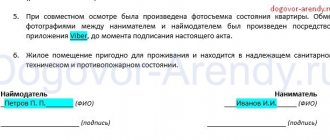Commercial rental agreement for residential premises: procedure for filling out, sample for downloading
As follows from Article 671 of the Civil Code of the Russian Federation, a commercial rental agreement for residential premises is an agreement under which one party transfers living space to the other for use for its intended purpose. In these legal relations, rights and obligations are distributed between the landlord and the tenant. According to Article 91.16 of the Civil Code of the Russian Federation, only part of a commercial rental house (room, block, etc.) can be an object.
A legal entity can also be a party to the agreement (tenant). However, the accepted facility can only be used to accommodate company employees. The rooms, as a rule, are completely ready for guests to move in: equipped with furniture and household appliances.
The contract must include the following details:
- Location of the object (city, street, house, number);
- Type of area (apartment, room, block);
- List of property to be leased (furniture, household appliances, interior items, plumbing fixtures);
- The tenant's liability for damage to the landlord's property;
- Payment for the use of the area, the procedure for its payment, increase and revision (it is necessary to indicate the amount in rubles or in foreign currency at the Central Bank exchange rate, the day of transfer);
- The procedure for paying for utilities and telecommunications (telephone, Internet, etc.);
- Advance or amount of collateral acting as security for the obligations of the tenant;
- Duration of the agreement (in the absence of this clause, it is considered concluded for 5 years);
- Additional conditions (for example, the tenant may be required to carry out cleaning, maintain electrical appliances, carry out routine repairs, etc.).
We recommend commercial rental agreements for residential premises and make sure that they comply with the agreement being concluded. It should be noted that residential premises are subject to intended use only: it cannot be turned into an office, showroom, or store. If one of the parties violates the terms of the agreement, the second party to the legal relationship has the right to terminate the transaction and demand compensation for losses (if any).
If the premises used for rental have changed ownership, this does not entail automatic termination of the contractual relationship. The new owner is obliged to comply with the terms of agreements concluded previously.
How to write a document correctly?
A commercial lease agreement for residential premises, a standard example of which can be found below, must be drawn up in writing. Although an oral transaction can be recognized as valid in court, this will require the provision of significant evidence (for example, receipts for payment for an apartment). The testimony of witnesses cannot be used in this case (Article 162 of the Civil Code of the Russian Federation).
Sample commercial rental agreement for residential premises
The content of a commercial lease agreement drawn up according to the sample must include the following information:
- a detailed description of the property that is the subject of the transaction (Article 673 of the Civil Code of the Russian Federation);
- fee charged for accommodation in residential premises;
- validity period of the transaction;
- frequency of payment made;
- a list of people who are going to live with the employer on a permanent basis;
- information about all parties to the transaction (the tenant’s family is also included in the contract);
- signatures of the parties.
Before completing the transaction and when registering the encumbrance that has arisen, some papers may be required, namely:
- consent from all co-owners of the property (the spouse’s permission form can be downloaded below);
- title documentation;
- identification documents of the parties;
- power of attorney addressed to the representative, if required.
Sample consent of a spouse to enter into a transaction with jointly owned property
Parties to the transaction
A commercial landlord can be either a citizen or an organization (that is, a legal entity) that owns the rental property or has the appropriate permission from the landlord. If there are several co-owners, when signing papers, consent from all owners is required, in accordance with Article 247 of the Civil Code of the Russian Federation.
Employers include exclusively citizens (regardless of their property status and citizenship). When drawing up the document, it is important to indicate a list of persons who are going to live together with the tenant on a permanent basis (Article 677 of the Civil Code of the Russian Federation).
If the last condition is not met, the resettlement of citizens is carried out, in accordance with Article 679 of the Civil Code of the Russian Federation, subject to the following conditions:
- with the written consent of all persons living at this address (with the exception of children under the age of majority, since they have the right to move into the apartment with their parents without obtaining permission from other residents);
- if the number of residents complies with the standards adopted by law for living space allocated per person (this rule also does not apply to children).
Deal validity period
Based on Article 683 of the Civil Code of the Russian Federation, the maximum period for which an agreement can be concluded is 5 years. If the text of the document does not specify the period of validity of the completed transaction, it is considered concluded for this period.
To terminate a contract or enter into a new one after its expiration, a citizen must contact the landlord at least 3 months before the expiration of the document.
Registration actions
Within 30 days from the date of signing the agreement, a sample of which can be found above, the party must contact the unified Rosreestr to register the resulting restriction on the rights to own housing (Part 2 of Article 674 of the Civil Code of the Russian Federation). This rule applies only to transactions concluded for a long period. The application form is issued by government agency employees.
SAMPLE COMMERCIAL LEASE AGREEMENT OF RESIDENTIAL PREMISES
Appendix No. 3 to Recommendations on the procedure for preparing an extract from the decision of the executive authority and contracts for the use of residential premises (introduced by Order of the Municipal Housing Committee dated 04/29/1999 No. 97) SAMPLE COMMERCIAL LEASE AGREEMENT OF RESIDENTIAL PREMISES Moscow “__”___________ _____ Municipal Committee housing of the Moscow Government represented by its head (deputy head) _____________________________, (last name, first name, patronymic) acting on the basis of the Regulations on the Municipal Housing Committee”, approved by Order of the Mayor of Moscow dated 10/14/1996 No. 388/1-RM, and Decree of the Moscow Government dated November 28, 1995 No. 964 “On introducing amendments and additions to the Decree of the Moscow Government of February 16, 1993 No. 142 “On streamlining the organization of management of the housing stock in Moscow”, Orders of the Moscow Municipal Housing Committee dated January 24, 1997 No. 10 “On the transformation (reorganization) of structural divisions of the Municipal Housing Committee”, hereinafter referred to as “Landlord”, on the one hand, and citizen ____________________________________________________________ (full name, ______________________________________________________________________ residence address, _____________________________________________________________________, passport details) hereinafter referred to as “ Tenant", on the other hand, on the basis of an extract (reg. No. ___________ dated "___"__________ ___) from the decision _______________________ dated "___"_________ ____, we entered into this agreement on the following: I. SUBJECT OF THE AGREEMENT 1.1. Under a commercial lease agreement, the Lessor rents out, and the Tenant accepts for fixed-term paid possession and use, a house, apartment (apartments) - (hereinafter referred to as residential premises (residential premises) belonging to state and (or) municipal property, located (located) at the address: city ________________________________________________________________ administrative district (municipal area) _________________________ house No. _____ apartment(s) No. ___, consisting of _____________________, on the street ______________________________________________________________ For residential use: 1. ________________________ _______________________________________________________________________________ (tenant) 2. ___________________________________________________________________ (subtenant) 3. ___________________________________________________________________ (citizens residing permanently) 1.2. The rental period for residential premises is established: for _________ _______ years, from “__”______ ____ to “___”_________ ____ II. OBLIGATIONS OF THE PARTIES 2.1. The lessor is obliged: 2.1.1. Within 15 days after signing the agreement, provide the residential premises specified in clause 1.1 of this Agreement to the Tenant. 2.1.2. When carrying out major repairs of a residential building, as well as in cases provided for by current legislation, provide other residential premises that meet sanitary and technical standards. 2.2. The risk of accidental destruction of the rental premises lies with the Landlord in accordance with current legislation. 2.3. The employer is obliged: 2.3.1. Use the residential premises specified in clause 1.1 of this agreement for residential purposes only. 2.3.2. Maintain the residential premises in technically sound and proper sanitary condition on their own or by concluding agreements with organizations that carry out repairs and operation of the residential building. 2.3.3. Do not carry out alterations or re-equipment without the written permission of the Landlord and the interdepartmental commission. 2.3.4. Promptly carry out current repairs of residential premises at your own expense. Provide the management and employees of organizations carrying out the repair and operation of a residential building with unhindered access to the residential premises to inspect its technical and sanitary condition, as well as the engineering equipment located in it. 2.3.5. When renting out residential premises, either in whole or in part, in compliance with the requirements (clauses 2.3.1 - 2.3.4) under a sublease agreement, agree on an agreement with the Landlord and the Directorate of the single customer. 2.3.6. Pay the fee for the use of the residential premises within the time limits established by this agreement. 2.3.7. If the premises are vacated, pay the Landlord the cost of repairs to the premises that were not carried out by him and are his responsibility, or carry them out at his own expense, as well as pay the debt on other obligations. 2.3.8. When vacating the residential premises, transfer it to the Landlord within a month. When vacating the residential premises, improvements made by the Tenant are not subject to compensation by the Landlord, unless otherwise provided when agreeing on a permit for improvement. 2.3.9. With the Directorate of the single customer, prepare the necessary documents for the maintenance of the residential premises, as well as for shared participation in the costs of maintaining the common areas of the residential building, engineering equipment and local area (calculation of the amount of payments for maintenance, issuance of the corresponding payment books, opening a personal account etc.). III. CALCULATIONS 3.1. For the residential premises specified in clause 1.1 of the contract, the Tenant pays rent for the residential premises in the prescribed manner on a monthly basis no later than the 10th day of the month following the previous month in the amount of ________ rubles. 3.2. The difference in recalculation is paid by the Tenant at the next payment. Recalculation is made based on the requirements of current regulatory legal acts. IV. PROCEDURE FOR TERMINATION OF THE AGREEMENT 4.1. Termination of the contract is permitted by agreement of the parties. 4.2. The rental agreement is subject to early termination at the request of the Landlord, and the Tenant and citizens for whose actions the Tenant is responsible are subject to eviction in the following cases: 4.2.1. When using residential premises (in whole or in part) in violation of clause 1.1 of this rental agreement. 4.2.2. If the Tenant and the citizens for whose actions he is responsible deliberately damage or negligently destroy residential premises, as well as systematically violate the rights and interests of neighbors. 4.2.3. If the Tenant has not made the payments specified in clauses 2.3.6, 2.3.9, 3.1 within six months. 4.2.4. If the Tenant systematically violates the obligations under the contract. 4.3. The rental agreement may be terminated at the request of either party: 4.3.1. If, due to circumstances, the residential premises turn out to be in a state that is not suitable for its intended use, in an emergency condition, and is also subject to demolition, the Landlord is obliged to conclude a lease agreement with the Tenant for another residential premises within 3 months or, at the Tenant’s request, terminate this agreement. 4.3.2. A terminated contract cannot be renewed. 4.4. The tenant, who fulfills the obligations assumed under the rental agreement, has a pre-emptive right to conclude an agreement for a new term. V. OTHER CONDITIONS 5.1. By agreement of the parties, the Tenant has the right to purchase the residential premises, including with payment in installments. 5.2. All changes and additions to this agreement are valid if they are set out in writing and signed by both parties. 5.3. Disagreements arising in the process of concluding and executing a contract are considered in court. 5.4. On issues not covered by this agreement, the parties are guided by the legislation of the Russian Federation and the city of Moscow. 5.5. This agreement has been drawn up in 2 copies, one of which is kept by the Tenant, one by the Landlord. A copy of the agreement is in the Directorate of the single customer. All copies have the same legal force. VI. LEGAL ADDRESSES OF THE PARTIES On behalf of the Landlord: On behalf of the Tenant: Municipal Housing Committee Individual: Moscow Government represented by _________________________________ _________________________________ _________________________________ ___________________________________ (index, postal address, tel.) (last name, first name, _________________________________ __________________________________ (current account) patronymic in full) _________________________________ __________________________________ (signature of the manager, seal) (passport data - series, __________________________________ No., when and by whom issued) ___________________________________ (address of residence, ___________________________________ telephone) ___________________________________ (signature) The terms of the agreement are familiar with: Citizens residing permanently 1. _______________________________ (F.I. .O.) __________________________________ (passport data) 2. ________________________________ (full name) ___________________________________ (passport data) 3. ________________________________ (full name) __________________________________ (passport data)
QUESTIONNAIRE OF A PERSON SENDED FOR FORCED TREATMENT IN AN OCCUPATIONAL TREATMENT CENTER »
Standard forms, contracts »
List of essential terms of the lease agreement
And even when choosing a payment method, partners can proceed from their own interests. In most cases, payment is made in cash or by bank transfer. However, there are other forms of payment, which are also spelled out in detail in the lease agreement as one of the essential terms of the agreement:
- For the entire object (a room, an entire building, a production workshop, a car with or without a crew, etc.) - this is the most common, simple case.
- Per unit of total area – i.e. per square meter or other units. In this case, the actual differences between different premises (heated, unheated, industrial, commercial, warehouse, etc.) are not taken into account.
- Per unit area of individual premises, i.e. just taking into account the different prices of different real estate objects (the amount is usually broken down into components and then summed up).
We recommend reading: Calculation of state fees in court
Essential terms of a standard rental agreement
· According to clause 1 of Article 677 of the Civil Code of the Russian Federation, only a legally competent citizen can be a tenant under a residential lease agreement. Legal entities may be provided with possession and (or) use of residential premises on the basis of a lease or other agreement, but not a lease agreement for residential premises, since this agreement provides for the specific purpose of transferring residential premises into possession and use - for the tenant to live in it. A legal entity cannot itself live in residential premises; it can only transfer the received residential premises for the use of citizens (clause 2 of Article 671 of the Civil Code of the Russian Federation).
· The tenant, with the consent of the landlord, may transfer for a period of time part or all of the premises rented by him for the use of a subtenant. The subtenant does not acquire independent rights to use the residential premises. The tenant remains responsible to the landlord under the residential lease agreement (Clause 1, Article 685 of the Civil Code of the Russian Federation).




